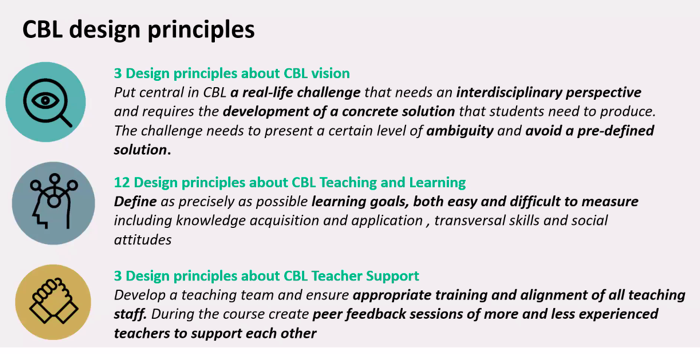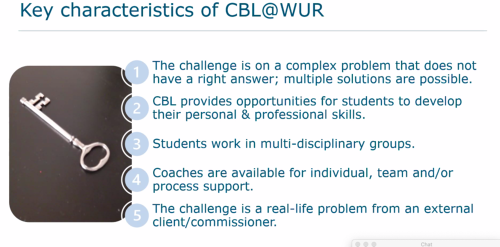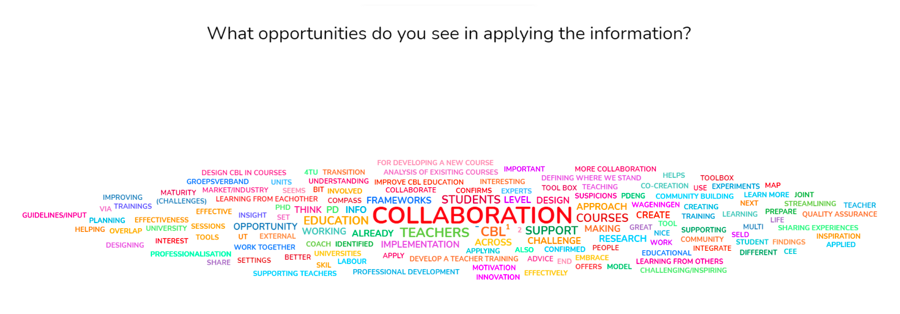Blog by 4TU.CEE coordinators Renate Klaassen (TUD) & Chris Rouwenhorst (UT)
In this session on the 26th of January around 120 participants focused on educational design principles. It was introduced by dr. Cindy Poortman. The audience showed a great interest in Challenge Based Education and highly appreciated the webinar. To get a better insight into the design principles, we looked into 3 different research projects from three universities of technology. Based on these 3 presentations, we found there is significant overlap at UT, TU/e and WUR in the critical characteristics in CBE. As each of these is researched differently from literature review, practice-based research, to experts in a Delphi study, we may conclude that these essential features can be taken as "The CBE/CBL" critical features at the 4TU consortium level. These features are: Real life and complex problem; External stakeholders involved; Interdisciplinary; Self-direction and Personal development.
Leonie Bosch-Chapel, Koen DePryck (UT): Challenge Based Learning Maturity Model:
Koen DePryck and Leonie Bosch-Chapel made a framework for qualitative evaluation of CBE based on a literature review of 113 articles in journals and conference papers from WoS, EBSCO, Scopus. Critical features of CBL, according to the literature review, are interdisciplinary collaboration, competence development and self-directed learning, stakeholder involvement and real-world challenges. Each of these has its own key features and has been used to create the maturity model. The tool allows teachers to screen their courses to find out whether and how much their course is challenge-based and programme management and policymakers contribute to their system's quality. They have two levels of screening with the focus on learning activities based on the principles of instruction (Merrill, 2002), challenge centred, activation, demonstration, application and integration. Parallel, there is a focus on resource and support adapted from Margayan (2018), mobilising the available collective knowledge in collaboration, using differentiation, authentic resources and feedback. Each of these contributes to the process components in education.

Antoine van der Beemt (Tu/E)– Challenge Based Learning: Educational Design Principles
This study aimed towards mapping the landscape and common patterns in CBL and guiding the educational practice of CBL. Generally, the vision is that challenge-based education consists of real-life authentic and complex challenges, addresses global themes, and multiple stakeholders with challenge owners from science and industry. Concerning learning, it is observed that the general intention for learning is educating T-shaped engineers, who are self-directed in their education and primarily act as co-creators, learners and coaches alongside the teachers. The teaching format tends to be collaborative and interdisciplinary – stimulating teamwork and developing professional skills. Assessment is both process and product-focused.

Cassandra Tho (WUR): Challenge-Based Learning at Wageningen University & Research
Cassandra Tho has shared her Delphi study results into the key characteristics of CBE at Wageningen university and reported the following key elements. This study particularly pointed out that the focus of CBE within the curricular structure is on developing collaboration and teamwork skills, professional skills, responsibility and ownership for the project and handling different perspectives. Personal development and operating in a complex environment with stakeholders and process management is to a large extent done outside the curricular structure in Wageningen. Some courses identified as CBE are not conceptually based on challenge-based learning and are more in project-oriented learning. The question arose whether there should be a threshold when we find something Challenge based education?
During the discussion we asked the audience the question: ‘What opportunies do you see in applying the information provided from the presenters?'
The image below shows the result of that question.

More information
Want to know more? The full video on Educational Design Principles can be found here. Join us for the next webinar on CBE: Assessment on the 21 April at WUR!
About the webinar series
4TU.CEE continues the webinar series on challenge-based education at the 4TUs. The new series will discuss research into CBE/CBL practices and will focus on students, lecturers and stakeholders. What can these groups learn when participating in CBE/CBL trajectories?



